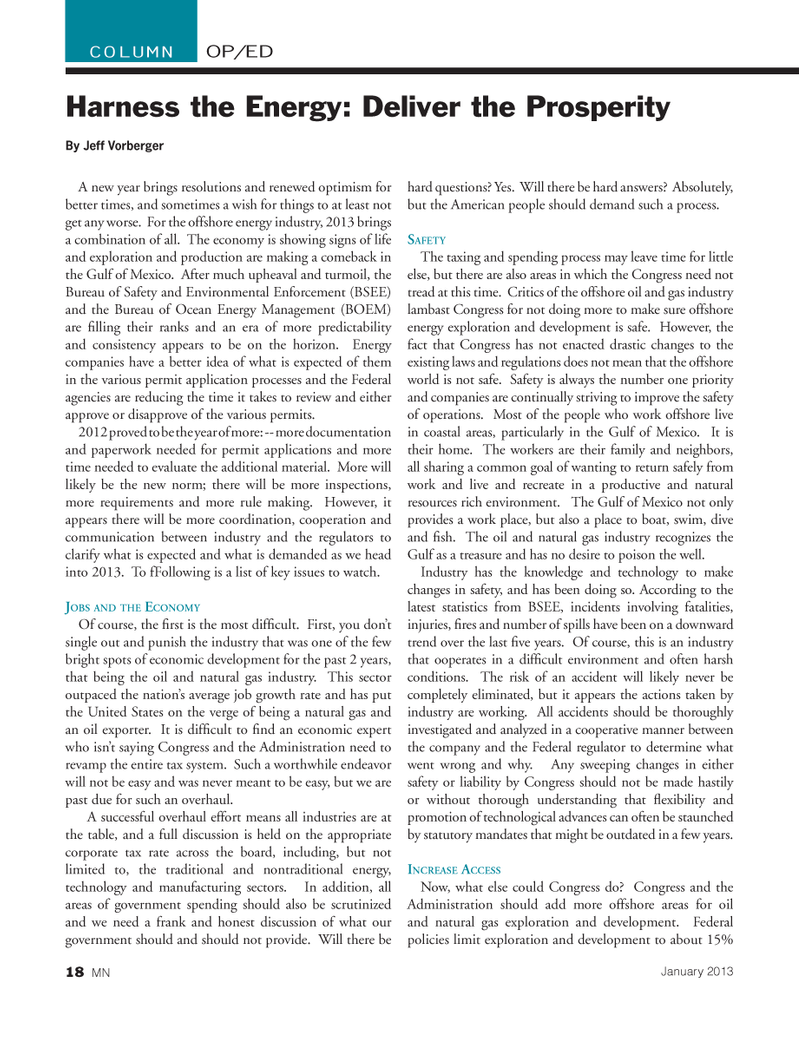
Page 18: of Marine News Magazine (January 2013)
Training and Education
Read this page in Pdf, Flash or Html5 edition of January 2013 Marine News Magazine
A new year brings resolutions and renewed optimism for better times, and sometimes a wish for things to at least not get any worse. For the offshore energy industry, 2013 brings a combination of all. The economy is showing signs of life and exploration and production are making a comeback in the Gulf of Mexico. After much upheaval and turmoil, the Bureau of Safety and Environmental Enforcement (BSEE) and the Bureau of Ocean Energy Management (BOEM) are Þ lling their ranks and an era of more predictability and consistency appears to be on the horizon. Energy companies have a better idea of what is expected of them in the various permit application processes and the Federal agencies are reducing the time it takes to review and either approve or disapprove of the various permits. 2012 proved to be the year of more: -- more documentation and paperwork needed for permit applications and more time needed to evaluate the additional material. More will likely be the new norm; there will be more inspections, more requirements and more rule making. However, it appears there will be more coordination, cooperation and communication between industry and the regulators to clarify what is expected and what is demanded as we head into 2013. To fFollowing is a list of key issues to watch. JOBS AND THE ECONOMYOf course, the Þ rst is the most difÞ cult. First, you donÕt single out and punish the industry that was one of the few bright spots of economic development for the past 2 years, that being the oil and natural gas industry. This sector outpaced the nationÕs average job growth rate and has put the United States on the verge of being a natural gas and an oil exporter. It is difÞ cult to Þ nd an economic expert who isnÕt saying Congress and the Administration need to revamp the entire tax system. Such a worthwhile endeavor will not be easy and was never meant to be easy, but we are past due for such an overhaul. A successful overhaul effort means all industries are at the table, and a full discussion is held on the appropriate corporate tax rate across the board, including, but not limited to, the traditional and nontraditional energy, technology and manufacturing sectors. In addition, all areas of government spending should also be scrutinized and we need a frank and honest discussion of what our government should and should not provide. Will there be hard questions? Yes. Will there be hard answers? Absolutely, but the American people should demand such a process. SAFETY The taxing and spending process may leave time for little else, but there are also areas in which the Congress need not tread at this time. Critics of the offshore oil and gas industry lambast Congress for not doing more to make sure offshore energy exploration and development is safe. However, the fact that Congress has not enacted drastic changes to the existing laws and regulations does not mean that the offshore world is not safe. Safety is always the number one priority and companies are continually striving to improve the safety of operations. Most of the people who work offshore live in coastal areas, particularly in the Gulf of Mexico. It is their home. The workers are their family and neighbors, all sharing a common goal of wanting to return safely from work and live and recreate in a productive and natural resources rich environment. The Gulf of Mexico not only provides a work place, but also a place to boat, swim, dive and Þ sh. The oil and natural gas industry recognizes the Gulf as a treasure and has no desire to poison the well. Industry has the knowledge and technology to make changes in safety, and has been doing so. According to the latest statistics from BSEE, incidents involving fatalities, injuries, Þ res and number of spills have been on a downward trend over the last Þ ve years. Of course, this is an industry that ooperates in a difÞ cult environment and often harsh conditions. The risk of an accident will likely never be completely eliminated, but it appears the actions taken by industry are working. All accidents should be thoroughly investigated and analyzed in a cooperative manner between the company and the Federal regulator to determine what went wrong and why. Any sweeping changes in either safety or liability by Congress should not be made hastily or without thorough understanding that ß exibility and promotion of technological advances can often be staunched by statutory mandates that might be outdated in a few years. INCREASE ACCESSNow, what else could Congress do? Congress and the Administration should add more offshore areas for oil and natural gas exploration and development. Federal policies limit exploration and development to about 15% OP/EDCOLUMNHarness the Energy: Deliver the Prosperity By Jeff Vorberger 18 MNJanuary 2013 MN Jan2013 Layout 18-31.indd 18MN Jan2013 Layout 18-31.indd 181/2/2013 2:04:20 PM1/2/2013 2:04:20 PM

 17
17

 19
19
